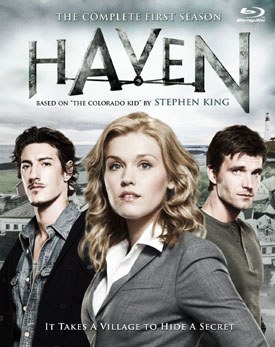 I should point out right off the bat that I don’t watch regular TV. Among other reasons, I’m a binge-watcher, and I can’t stand to wait a week for the next episode of anything – somehow, a single thirty- or forty-minute dose just isn’t enough to maintain my interest. (I’m the same way with comics, which I why I generally wait for the trade paper collections.) However, thanks to Netflix, I get to indulge my binge-watching tendencies. I also get to shop around for what looks interesting, which is how I ran across Haven.
I should point out right off the bat that I don’t watch regular TV. Among other reasons, I’m a binge-watcher, and I can’t stand to wait a week for the next episode of anything – somehow, a single thirty- or forty-minute dose just isn’t enough to maintain my interest. (I’m the same way with comics, which I why I generally wait for the trade paper collections.) However, thanks to Netflix, I get to indulge my binge-watching tendencies. I also get to shop around for what looks interesting, which is how I ran across Haven.
Haven is a small town on the coast of Maine that is generally unremarkable, except that some of the inhabitants have what we might call “special abilities.” These are mostly not an issue, but it seems that every twenty-seven years, what the residents (those in the know, at least) call “The Troubles” start cropping up: for some reason, these abilities become active, and can have unforeseen and often dire consequences. Enter FBI Special Agent Audrey Parker (Emily Rose), in pursuit of an escaped felon, just when The Troubles are starting to make themselves felt. Among her first acquaintances are Det. Nathan Wuornos (Lucas Bryant), whom she meets when she runs off the road due to a large crack that suddenly appears in the pavement; his father, Garland Wuornos (Nicholas Campbell) the chief of police; Duke Crocker (Eric Balfour), engaged in the importing business (some of his imports are even legal); and Vince and Dave Teagues (Richard Donat and John Dunsworth), who run the local paper – which tends to publish reports on The Troubles that are fit for public consumption. Vince and Dave show Audrey a picture of a mysterious woman who appeared in Haven twenty-seven years before, and who was somehow associated with the equally mysterious death of a man known only as the Colorado Kid. She’s a dead ringer for Audrey, and Audrey, an orphan who has no knowledge of her birth family, comes to the not unreasonable conclusion that this woman was her mother. Things start to get really knotty at the end of season one, when an FBI agent named Audrey Parker arrives in town.
To belabor the obvious first, the series is set in coastal Maine, filmed largely in Nova Scotia, and the settings are just what you might expect – wild and rocky. I might add that the cinematography is superb, and the directors have made good use of panoramas in setting scene and mood.
The writing is a cut above good, and the sheer inventiveness of the many and varied Troubles makes for some good viewing. Dialogue is perfectly apt and not only moves the story along as it contributes to our understanding of the characters, but gives hints of more mysteries underlying the ones we can see – there’s always someone who knows more than they’re telling, not to mention the cottage industry involved in keeping the real causes of the bizarre events – like the whole town falling asleep all at once – explainable by normal means. (“Gas leak” gets a workout.)
The cast, not only the recurring major characters but those who appear in one or two episodes, get major kudos for making their characters into real people. Happily, the writers left room for character development, but the cast take it a step or two beyond what the writers wrote: it’s a matter of small gestures, characteristic facial expressions, personal tics that round out the dialogue and build a visual context for it.
While the characters are well developed and the interpersonal relationships develop along with them, the series doesn’t devolve into melodrama/soap opera, at last on that level, and manages to sail along for most of three seasons as an interesting and engaging mystery/thriller with supernatural elements. Sadly, it seems inevitable these days that a series such as this will develop in a way that can only be called “baroque,” as central mysteries (in this case, Audrey’s real identity) become ever more convolute. Haven doesn’t escape, and at the end of Season Three and into Season Four we are faced with a series that keeps going because people keep doing stupid things instead of the obvious things that would be smart (and probably lead to a more credible story line), and in some cases go directly against the characters as they have been developed. (I am reminded of a daytime serial, as they call them, from the 1980s I believe, that actually started a story line about alien abductions. Haven comes uncomfortably close to that at the end of Season Three.)
Now, bear in mind that this is the result of a couple of viewings, when the rough places start to take on more prominence. I have no trouble recommending Haven as an excellent subject for binge-watching as a one-time, or, if your tolerance for bizarre and unbelievable story lines is greater than mine, even a couple of times.
(SyFy Channel [Entertainment One, Big Motion Pictures, Piller/Segan/Shepherd], 2010-2013, ongoing)
